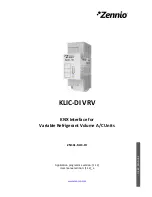
Chapter 8 Network variable bindings
134
BAS-APG001-EN
A unique subnet/node binding type is a specific path from device X to
device Y. Any number of actual network variable bindings could be
built upon this path (see below). Regardless of the number of bindings
built on a given path, only one address table entry will be consumed
on the sending device. Note that this rule applies to subnet/node bind-
ings that are part of one-to-one binding shapes or fan-in binding
shapes.
3.
Unique group binding types consume an address table entry on all
devices in the group.
A unique group binding type is a specific fan-out path from device X
to a specific set of target devices (for example, Y and Z). Any number
of actual network variable bindings could be built upon this path (see
below). If another sending device and/or another set of target devices
is necessary, a new group is needed and another address table entry
will be consumed in each group member.
4.
Each LonWorks device has a maximum of 15 address table entries.
This limit applies to all LonWorks devices: Neuron-based devices,
host-based devices (including the BCU), and hybrid devices. Note that
the Tracer VV550/551 is an exception; it has only 14 available
address table entries.
5.
A maximum of 256 groups are possible per domain.
This limit should not be a factor in most designs.
6.
A group binding that uses acknowledged service can have a maximum
of 64 members. A group binding that uses unacknowledged or
unacknowledged repeated service can have an unlimited number of
members.
Stacking bindings on unique binding paths
Once a binding has been created, a unique path exists that is defined in
the address tables. It is important to understand that these unique paths
can be reused by additional bindings without consuming additional
address table entries.
A unique path is possible for subnet/node binding types (one-to-one or
each piece of a fan-in) and group binding types (fan-out). A unique path is
defined by a sending hub and a specific set of receiving target devices.
The simplest unique path is that shown in Figure 74. The three bindings
below will consume one entry, the domain/subnet/node of MP581-B, in
MP581-A’s address table. They will not consume any entries in MP581-
B’s address table. Only MP581-A is the transmitter in this example. This
is a subnet/node binding. A good analogy would be that the road between
MP581-A and MP581-B has already been laid down (in one direction).
Any other information needed to flow between those two devices has a
well defined route already available.
Summary of Contents for Engineered Smoke Control System
Page 1: ...BAS APG001 EN Applications Guide Engineered Smoke Control System for TRACER SUMMIT ...
Page 2: ......
Page 6: ......
Page 12: ...Contents vi BAS APG001 EN ...
Page 30: ...Chapter 1 Smoke control overview 18 BAS APG001 EN ...
Page 48: ...Chapter 3 Installation diagrams 36 BAS APG001 EN Figure 14 Tracer MP581 to FSCS wiring ...
Page 50: ...Chapter 3 Installation diagrams 38 BAS APG001 EN Figure 15 Tracer MP581 to FACP wiring ...
Page 57: ...Wiring high voltage ac power BAS APG001 EN 45 Figure 19 AC wiring ...
Page 59: ...EMI RFI considerations BAS APG001 EN 47 Figure 20 Checking the earth ground ...
Page 75: ...EMI RFI considerations BAS APG001 EN 63 Figure 31 Checking the earth ground ...
Page 96: ...Chapter 5 Installing the Tracer MP581 programmable controller 84 BAS APG001 EN ...
Page 110: ...Chapter 6 Installing the EX2 expansion module 98 BAS APG001 EN ...
Page 123: ...End process verification BAS APG001 EN 111 Figure 61 ast actuator fail checkb 3 13 06 ...
Page 132: ...Chapter 7 Programming 120 BAS APG001 EN ...
Page 151: ...Understanding bindings BAS APG001 EN 139 Figure 79 Mixed subnet node and group bindings ...
Page 152: ...Chapter 8 Network variable bindings 140 BAS APG001 EN ...
Page 154: ...Appendix A References 142 BAS APG001 EN ...
Page 155: ......











































